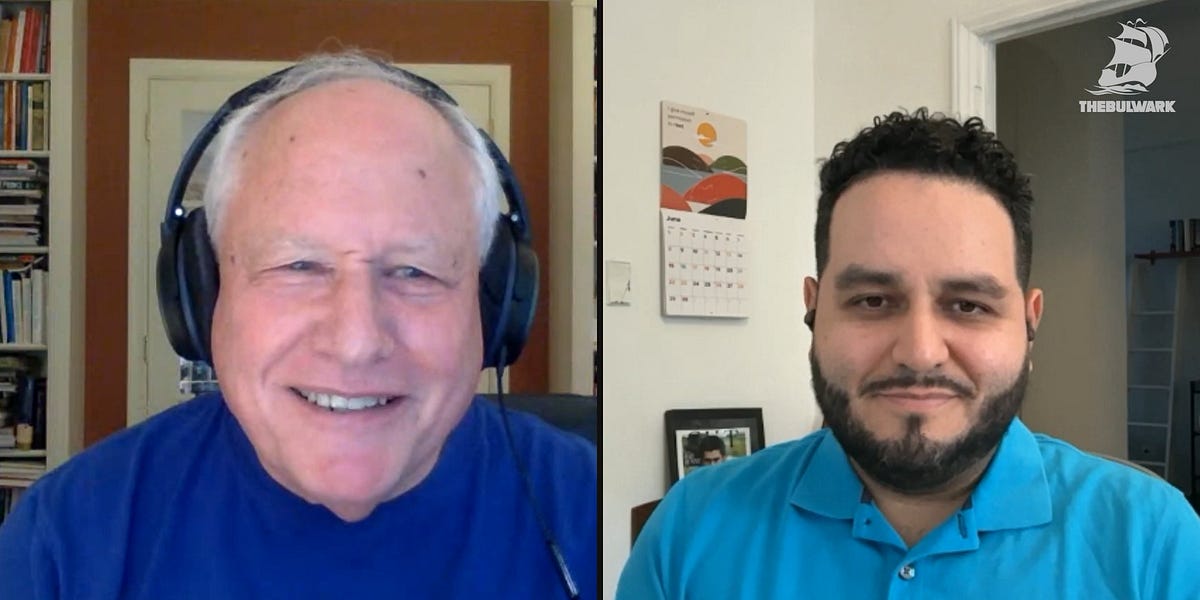
The One Thing Elon Musk Is Right About
June 8, 2025
Bulwark on Sunday: LA Erupts as Immigration Raids Spark Citywide Protests
June 8, 2025 Benjamin Balthaser
The first counterintuitive fact one has to understand is that American Jewish left was kind of an autochthonous development; it was not an import from foreign shores. Indeed, I might turn the question around a little and ask: Why did a Jewish left emerge in the United States? It may seem unlikely, given that the US isn’t typically known for its progressivism.
Yet it’s also important to remember that May Day begins in the United States. Karl Marx, for instance, wrote very movingly about the American labor movement; the 1870s and 1880s in the US saw some of the most radical strikes and organizing anywhere in the world. The Haymarket martyrs and the eight-hour-day movement were hugely influential on the global left.
This is also a moment in which we see a huge influx of mostly working-class Jews fleeing the Pale of Settlement in Eastern Europe and arriving amid this maelstrom of labor union activity. These Jews were aware of the connection between Jewish emancipation and European democratic revolutions — they arrive in the United States and encounter German, Mexican, and other immigrant labor activists. These Yiddish-speaking Jewish immigrants came to America and joined the ranks of the proletariat and encountered German and other immigrant socialists. Many of them became socialists not in Europe, but once they arrived in the US.
The interesting question isn’t, “Why did Jews join the left?” Lots of ethnic groups in Europe had an outsize left presence for a time. Germans in the nineteenth century and, in the early twentieth century, Finns made up a huge portion of the Communist Party. The question is instead how and why the Jewish left in America took shape the way it did.
The Jews were actually very similar to other ethnic groups who either brought radicalism with them or became radicalized once they joined the American labor movement. But why did the radicalism persist?
For the Finns and the Germans, it basically lasted a generation, maybe two. But for Jews, it stuck around. If anything, until the 1950s, Jews who were members of the socialist movement became more radical the longer they stayed in America.
The narrative you’ll hear from many Jewish historians is this canard that radicals came from Europe, but as soon as they assimilated, they became proper liberal Democrats. That’s not actually what happened. Instead, these millions of Jewish immigrants became socialists on arrival. The longer they stayed, the more confidence they had in expressing their radical politics.
Mike Gold was a second-generation immigrant. Most of the Communist Party, as historian Michael Denning makes clear in The Cultural Front, was made up of second- and third-generation ethnic Americans — and a huge part of that was Jewish. The Jewish left made up a major portion of white ethnics in the Popular Front.
One reason Jews stayed in the Left longer is that, unlike the European left, the American left had to learn the language of anti-racism. America isn’t just a diverse society — it’s a country built on slavery and indigenous genocide. African Americans were a huge part of the labor movement, particularly in northern cities. By the late nineteenth and early twentieth centuries, labor organizers realized that bosses used racism to divide the labor movement. The more progressive and forward-looking factions of the labor movement — like the Wobblies, some wings of the Socialist Party, and the Communist Party — understood that they not only had to be anti-racist, they had to actively embrace the black working class. That was the only way to build a left-wing movement worth anything.
For American Jews, this was the first time that being part of an ethnic, minority left wasn’t at odds with left-wing politics. In Europe, as Enzo Traverso discusses in The Marxists and the Jewish Question, the European left often struggled with what to do with autonomous Jewish movements. The Bund, for example, frequently clashed with other leftist organizations. But in the US, the Left became the first political space where you truly had a multiethnic, left-wing movement in which Jewish ethnic politics wasn’t anti-leftist; it was an integral part of left-wing American culture. As Stuart Hall observed of another settler country, “race was the modality through which class was lived,” and for generations of Jews who still remembered the experience of second-class citizenship in Europe, this was a modality that spoke to their common sense.
Another important factor was that many Jewish leftists identified with African Americans as a way to confront and process their own experiences with antisemitism. Jews who came to America could see the connection immediately, particularly the Eastern European immigrant Jews who joined nascent socialist and Communist movements. When Jewish immigrants in the US saw African Americans being lynched, burned alive, and subjected to all kinds of bodily violations, many immediately recognized it. Many American Jews turned away from cross-racial solidarity; but many who joined the Left understood cross-racial solidarity as being not only the core principle of socialism in the US, but also diasporic Jewish identity.
One could say this was a left-wing form of assimilation. They tried to translate their Jewish experience into what they saw as an American idiom. And within the labor left, that American idiom was anti-racism — just as other Jews, seeking to assimilate into mainstream American whiteness, interpreted the American idiom as racism.
For better or worse, Jews have long had the experience of seeing themselves as a community — a diasporic community — wherever they go. There’s a shared expectation that wherever Jews settle, they gather together, organize, and maintain communal life. That sense of collective identity and community-building didn’t go away in the US. Left-wing Jews did the same thing. There were holidays, rituals, community events, and a sense that wherever you go, you get together as Jews. That wasn’t necessarily the case for other white ethnic diaspora groups.
Great Job Benjamin Balthaser & the Team @ Jacobin Source link for sharing this story.





